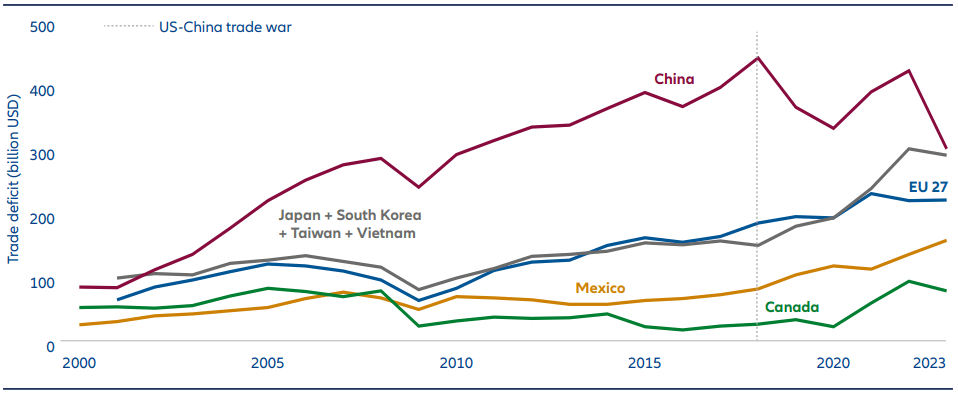Navigating Rates
Tariffs: an explainer

Tariffs have emerged as a risk to the global economy after US President Donald Trump announced plans for levies on imports from Canada, Mexico and China. Although not all the tariffs may materialise, the outlook remains uncertain: we think investors can position for targeted opportunities in fixed income and equities.
Key takeaways
- In a worse-case scenario, tariffs may fan inflation and undermine growth prospects in the countries in Mr Trump’s line of fire, as well as the US. But they also may widen the divergence between major economies, creating opportunities for investors to benefit from differences across fixed income markets.
- We see the trade dispute accelerating broader shifts in the geopolitical landscape already underway. Technology stocks are one area where geopolitics – and trade tensions – will inject volatility, with a more protectionist world hastening the trend of companies in different economic blocs building their own technological ecosystems.
- Until the outcome of global trade tensions becomes clearer, investors may consider positioning themselves in the middle to lower end of risk budgets. We think a diversified investment strategy without relying too heavily on any single asset class or geography may help investors ride out a volatile period ahead.
The prospect of US tariffs on key trading partners has raised fears of a trade war, unnerving financial markets. US President Donald Trump on 31 January announced a 10% levy on goods from China. China’s response was tariffs of between 10 and 15% on US liquified natural gas, coal, crude oil and farm equipment, as well as a competition investigation into US technology giant Google. US tariffs on Mexico and Canada, announced by Mr Trump the same day, were later delayed for one month.
Although some or all the tariffs may yet be watered down or averted altogether, they have raised fears of an escalating tit-for-tat that could create a more protectionist global economy. Mr Trump has suggested targeting other economies, including the European Union.
Those investors that had ruled out early action on tariffs were taken by surprise. Global equity markets initially slumped in response to the news, while oil prices and the US dollar surged. The Canadian dollar hit its lowest level since 2003, and the Mexican peso dipped almost 3 percent. Financial markets subsequently recovered but the outlook remains uncertain.
Tariffs have a wide-ranging impact on issues from inflation to technology. Here are three of the main factors to consider:
- Economic impact – potential inflation and growth risks: overall, tariffs would likely have a negative impact on global growth prospects. Tariffs are, in effect, taxes on imports that raise the cost businesses and consumers pay for goods and services. Tariffs increase how much companies may have to pay for imports used to produce final goods. Depending on the elasticity of consumer demand, firms generally pass the higher costs on to consumers through higher prices, fanning inflationary pressures. With tariffs making cross-border commerce between the US and the targeted countries more expensive and complex, trade may fall, potentially undermining economic growth. Trade accounts for a significant chunk of the GDP of Canada (67%) and Mexico (73%), less so for China (37%) and the US (24%).1 Companies reliant on exports for their business will likely be the hardest hit, potentially leading to lower production and job cuts. In the US, we expect the impact of rising tariffs to be partially offset by renewed fiscal stimulus and widespread deregulation. In China, we think the prospect of a trade war with the US may prompt China’s government to roll out fresh stimulus, which may also have a positive spillover for specific sectors and other countries. China’s exports rose 7% in 2024, one of the few bright spots in an economy battling weak domestic performance.
Investment implication: central banks may need to reassess their monetary policy plans if tariffs raise inflationary pressures. As markets, in turn, adjust their rate expectations, yields of rate-sensitive US Treasuries and other sovereign bonds may shift. While the US Federal Reserve is likely to reduce or even refrain from further rate cuts as the economy remains strong, the European Central Bank might accelerate its cutting cycle due to a further slowdown in the euro zone economy. In this environment, changes in interest rate paths and currency volatility may widen the divergence between major economies, creating opportunities for investors to benefit from differences across fixed income markets. - Geopolitical impact – hastening a shifting world
order: We see the trade dispute accelerating broader shifts in the geopolitical landscape that were already underway before Mr Trump’s second term. In recent years, the BRICS group of countries (Brazil, Russia, India, China and South Africa) has emerged and, despite major political differences, widened its membership as a counterbalance to the Western-dominated G7 group. Mr Trump has warned the BRICS not to replace the US dollar as a reserve currency, most recently threatening them with 100% tariffs. We see the risk of continuing to worsen relations between the BRICS and the G7. The US has shifted to an “America first” position. The country’s commitment to NATO looks less absolute than previously and its promise of more security to US allies has become transactional. We see the disruption to supply chains from tariffs hastening the existing trend of firms shifting links in their supply chains elsewhere. But the process of reshoring or nearshoring will be uneven as artificial intelligence and other technologies make it easier for some industries to shift supply chains than others.
Investment implication: technology stocks are one area where geopolitics – and trade tensions – will inject volatility. We think a more protectionist world may accelerate the trend of companies in different economic blocs building their own technological ecosystems. Competition between US and Chinese technology firms may lead to regulatory action (such as China’s antitrust investigation into Google) and broader market unpredictability as demonstrated by the sharp falls in US technology stocks in late January prompted by a new artificial intelligence product from Chinese startup DeepSeek. However, competition could also speed-up the spread of innovation and uptake of technology, leading to more rapid productivity growth than during previous industrial revolutions. We also anticipate a continuation of claims of sudden or revolutionary advancements for the foreseeable future and think maintaining a portfolio of well-diversified opportunities can serve investors well in this environment. - Trade impact – potentially less affected than feared: Despite the undoubted dampening activity of higher tariffs, we think global trade will persist and adapt to the changing patterns of commerce in a more volatile and protectionist landscape. We think it is instructive to consider what happened to trade after Mr Trump introduced tariffs during his first administration in 2018 and 2019. The US’s trading partnerships repositioned: it’s trade deficit with China almost halved, but its deficit grew with Southeast Asia, North American neighbours and other countries (see Exhibit 1). Overall, although trade volumes in the 2019-2022 period grew at a slower pace than the previous three-year period, data suggests the tariffs may have disrupted global trade only marginally. By 2022, international trade as a share of global GDP exceeded 60% for the first time in a decade, despite the higher level of tariff and non-tariff barriers to trade, and the slowing growth of trade superpower China.
Investment implication: Agility in sector and regional allocation will be key in 2025, leading us to favour an active – benchmark free – investment style. For example, in emerging markets we see many opportunities from the readjustment of the global order and trade wars. Some countries like Poland, Vietnam and India may profit from the shake-up as some developed markets face bilateral trade restrictions. As tariffs and other geopolitical risks become a bigger factor shaping global commerce, trade finance can help companies reduce financial uncertainty during geopolitical and economic change. For investors, trade finance may offer a safe haven, providing insulation from external shocks outside of the trade corridors of the affected countries. The asset class’s lack of correlation with financial markets shields it from major selloffs, making it particularly resilient during prolonged periods of geopolitical uncertainty.
Exhibit 1: The US’s trade deficits with major trading partners have shifted

Source: Comtrade, www.econovis.net
For illustrative purposes only.
Flight to safety in the near term
Against a backdrop of tariff uncertainty and higher market volatility, we expect safe havens to benefit in the short term. In the event of continuing tariff risks, we anticipate further gains for the US dollar, gold and energy prices, the latter buoyed by the prospect of levies on commodities including oil, natural gas and electricity. Markets that appear unscathed by immediate tariff risks could also present opportunities – for example, Japan and the UK.
Industries most reliant on the targeted markets for supplies are likely to be worst affected by any selling pressure – for example, car manufacturers with operations in Mexico and Canada supplying the US market. Market participants will be looking to signs of how quickly companies can adapt to greater protectionism, by shifting supply chains to markets undisrupted by tariff threats.
Until the outcome of global trade tensions becomes clearer, investors may consider positioning themselves in the middle to lower end of risk budgets. We think a diversified investment strategy without relying too heavily on any single asset class or geography may help investors ride out a volatile period ahead.
4225594







